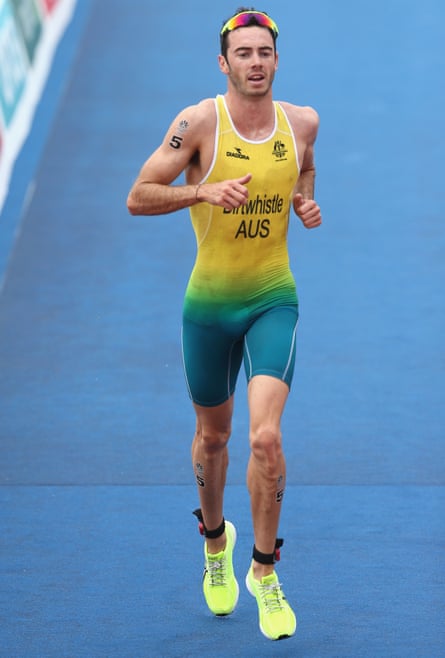At least 57 people fell ill with sickness and diarrhoea after competing in sea swimming events at the World Triathlon Championship Series in Sunderland, health officials confirmed this weekend.
About 2,000 people participated in the events last weekend, which included a swim off Sunderland’s blue flag Roker beach. The UK Health Security Agency (UKHSA) said it would be testing samples from those who were ill to establish the cause of the illness and any common pathogens.
An Environment Agency sampling at Roker beach on Wednesday 26 July, three days before the event, showed 3,900 E Coli colonies per 100ml, more than 39 times higher than typical readings the previous month. E coli is a bacterial infection which can cause stomach pain and bloody diarrhoea,
But British Triathlon, the governing body for triathlons in Great Britain, said the agency’s sampling results were not published until after the weekend’s events and were outside the body of the water where its competitions took place. It said its own testing results passed the required standards for the event.

The event was on a stretch of coastline that has been at the centre of a long-running battle over sewage discharges between campaigners and the government concerning regulatory failures.
Northumbrian Water insisted it was not to blame for the illnesses and that it had not recorded any discharges that might have affected the water quality at Roker beach since October 2021.
Jacob Birtwhistle, 28, an Australian triathlete, posted the Environment Agency’s results on Instagram and said he had felt unwell after the event. He wrote: “Have been feeling pretty rubbish since the race, but I guess that’s what happens when you swim in shit. The swim should have been cancelled.”
One athlete responded: “At least I know what got me and a bunch of other athletes who raced sick and ill.” Another wrote: “That now explains why I spent Monday night with my head in the toilet after racing Sunday morning!”
Ailith Eve Harley-Roberts, 51, from Leeds, who competed in the standard category with a 1,500-metre sea swim, said she had not fallen ill but fellow competitors suffered stomach upsets. She said: “I like to swim outdoors but don’t have any confidence in the cleanliness of seas, rivers, lakes etc because of the dumping of sewage or other effluents.”
Eva Perrin, science and research officer at campaign group Surfers Against Sewage, said: “The sample taken on 26 July showed unprecedented levels of E coli well over what is natural for this water body or safe for human recreational use, and urgently needs to be investigated.”

Bob Latimer, 79, a campaigner, pursued legal action for several years against the government over sewage discharges off Whitburn, which is north of Roker beach. A pre-action letter was sent on his behalf by the Environmental Law Foundation to the Department for Environment, Food and Rural Affairs (Defra) and the regulator Ofwat in June for a proposed judicial review, alleging there were 122 discharges in 2021 alone from the Whitburn sea outfall, totalling 821,088 tonnes of sewage and storm water.
Latimer says the sewage discharges from the Whitburn outfall increased between 2017 and 2021, and there has been a failure by the government to comply with waste water regulations. He said: “There is still too much sewage being discharged into the sea.”
Data published by the charity the Rivers Trust based on returns from water firms shows a sewer storm overflow discharged into the Wear Estuary, near the triathlon event, 28 times in 2022 for a total of 370 hours. Northumbrian Water said these sewage discharges would not affect Roker beach because they were “intercepted” and discharged by a long-sea outfall.
The triathlon event at Sunderland was the British leg of the World Triathlon Championship Series, and took place within the qualification window for the Paris 2024 Olympic games. There were also participation races in a variety of distances, including a family event. It was the first time Sunderland had hosted the UK leg of the series.
British Triathlon said it was working closely with Sunderland city council and the UKHSA to establish the cause of the illnesses. Environment Agency officials say its sampling on 26 July was not published until 31 July because it required a laboratory analysis.
The UKHSA said: “UKHSA is working with British Triathlon to encourage anyone who participated and has or had symptoms after the event to contact the organisers who will then pass details onto the UKHSA North East Protection team. The team will undertake an investigation of cases.”
There are various factors that can affect water quality, including the use of sewage overflows operated by water firms, as well as run-off from roads and fields. Northumbrian Water said it did not consider any of its infrastructure was involved in any pollution incidents that could have affected the triathlon events.
A spokesperson for Northumbrian Water said: “We have had no discharges from any of our assets that might negatively impact water quality at either Roker or the neighbouring Whitburn North bathing water since October 2021.
“Both bathing waters were designated as ‘Excellent’ in the latest Defra classifications, and sampling to date in the current season indicate this high quality is being maintained.”
Join the exciting world of cryptocurrency trading with ByBit! As a new trader, you can benefit from a $10 bonus and up to $1,000 in rewards when you register using our referral link. With ByBit’s user-friendly platform and advanced trading tools, you can take advantage of cryptocurrency volatility and potentially make significant profits. Don’t miss this opportunity – sign up now and start trading!








Recent Comments